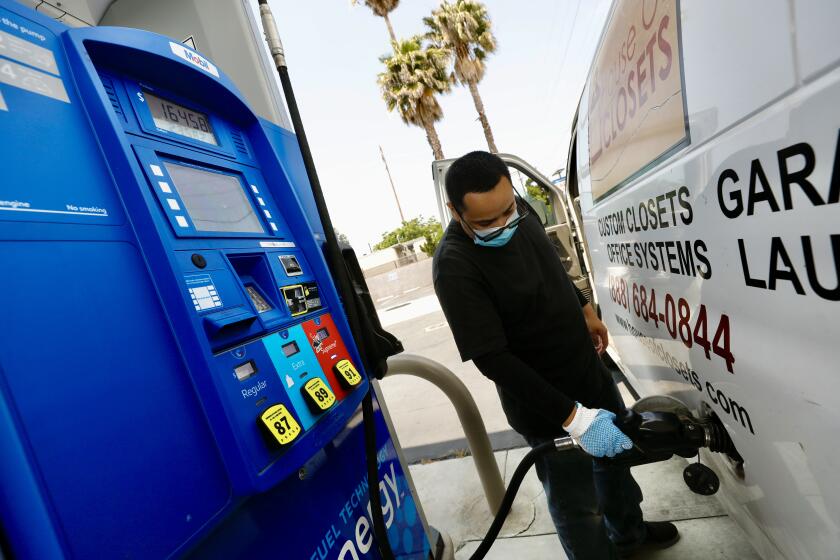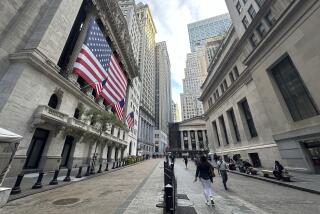Stocks stand still ahead of raft of earnings, economic data

- Share via
Wall Street remained stuck in its standstill Monday, and stocks again moved only modestly ahead of reports that could offer more direction on where the economy and corporate profits are heading.
The Standard & Poor’s 500 index edged up 3.52 points, or 0.1%, to 4,137.04 after barely budging last week. The Dow Jones industrial average rose 66.44 points, or 0.2%, to 33,875.40, while the Nasdaq composite slipped 35.25 points, or 0.3%, to 12,037.20.
Coca-Cola dropped 0.2% after reporting stronger profit and revenue for the first quarter but refraining from raising forecasts for sales and other measures for the full year. It was the only company in the S&P 500 to report Monday morning, but more than 170 others are scheduled to follow it this week.
The question is whether they can top the low bar that Wall Street has set for them, and what chief executives for those companies say about prospects for profits later this year. Analysts expect S&P 500 companies to report a roughly 6% drop in earnings per share from a year earlier, which would be their worst showing since the spring of 2020, when the pandemic paralyzed the economy.
Mixed signals — including layoffs, strong job growth and lingering inflation — have clouded the U.S. economic outlook.
Some of Wall Street’s most influential companies are set to report this week, including Microsoft on Tuesday and Amazon on Thursday. Several of these tech stocks were among the heaviest weights on the market. Microsoft fell 1.4%, and Amazon dipped 0.7%.
Fox fell 2.9% after it said the popular but polarizing prime-time host Tucker Carlson was leaving Fox News. The move comes less than a week after the company reached a $787.5-million settlement over charges that it promoted lies about Dominion Voting Systems through its 2020 election coverage.
Bed Bath & Beyond was another loser, dropping 35.7% to 19 cents after filing for bankruptcy protection. The struggling retailer’s stock has been on a wild ride as investors bet on whether it could successfully turn around its operations.
The majority of companies so far this earnings reporting season have topped forecasts, as is usually the case. That’s partly because expectations were so low coming into it. Inflation remains high, and interest rates are much higher than a year earlier, which has hurt swaths of the economy.
The Federal Reserve has jacked up interest rates at a furious pace in hopes of undercutting high inflation. High rates can do that but only by bluntly slowing the entire economy. That raises the chances for a recession and hurts prices for investments.
Besides this week’s blizzard of earnings reports, Wall Street is also waiting for the first estimate of how quickly the U.S. economy grew in the first three months of the year, among other data. Economists predict it will show a slowdown to an annual growth rate of 1.9%, down from 2.6% in the fourth quarter.
Higher interest rates have already slowed the housing market by making mortgages more expensive. Manufacturing and other areas of the economy have also lost steam, while the job market has remained remarkably resilient.
The number of homes for sale in Southern California has fallen to start the year, a reversal of normal trends as high mortgage rates keep sellers on the sidelines.
The report on the U.S. economy will be one of the final pieces of data before the Federal Reserve’s next meeting, scheduled for next week. Much of Wall Street expects it to raise interest rates at least one more time before taking a pause.
Many traders are betting the Fed will have to cut rates later this year to prop up the economy. But the Fed has so far been insistent that it will hold rates high at least through the end of this year.
“The Fed seems determined to fight inflation even if a more significant slowdown arrives,” Morgan Stanley strategists led by Michael Wilson wrote in a report.
High interest rates have already caused cracks in the banking system, with the second- and third-largest U.S. bank failures rocking markets last month. The worst of the crisis seems to have passed, but scrutiny remains harsh on smaller and midsize banks that seem to be under the most threat of seeing customers yank their deposits.
First Republic Bank, which has been at the center of the spotlight, reported its latest quarterly results after trading closed Monday. Its stock jumped 12.2% before the report, making it one of the biggest gainers in the S&P 500. It fell sharply in after-hours trading.
The banking industry’s struggles were global, as higher interest rates worldwide pushed investors to hunt for potential weak links. Credit Suisse, a giant investment bank, said Monday that it saw nearly $69 billion in outflows during the first three months of the year. It’s in the process of getting swallowed by rival UBS after regulators arranged for its takeover.
In the bond market, the yield on the 10-year Treasury fell to 3.50% from 3.57% late Friday.
AP writer Joe McDonald contributed to this report.
More to Read
Inside the business of entertainment
The Wide Shot brings you news, analysis and insights on everything from streaming wars to production — and what it all means for the future.
You may occasionally receive promotional content from the Los Angeles Times.












